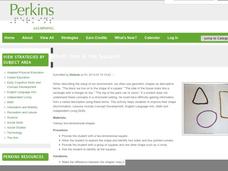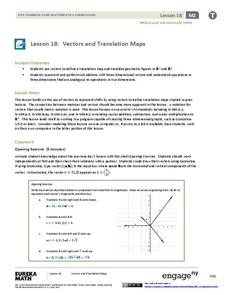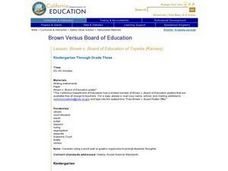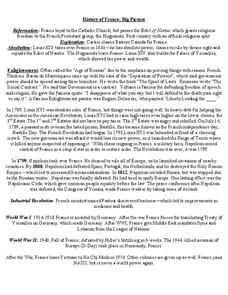Perkins School for the Blind
Rolling Along
I cannot stress enough how important orientation and mobility training is for learners with visual impairments. To practice maintaining their balance, as well as work on building the confidence to participate in recreational sports,...
Perkins School for the Blind
Figure Eight Walking
Walking in a straight line is one thing. Walking while trying to shift your weight from side to side to maintain balance is another challenge altogether. Learners with visual impairments practice walking in a figure eight. Cones are set...
Perkins School for the Blind
Packaging Snacks
Have your learners with special needs practice cooperative work skills, teamwork, and packaging. The kids will form an assembly line. Each pupil will add an item to a paper bag and then hand it off to the next person until the bag is...
Perkins School for the Blind
Bagging Groceries
Bagging groceries is a skill that can help learners with visual impairments understand organizing, problem solving, and weight discrimination. In addition, it is also a wonderful job skill. Help learners as they determine how to bag...
Perkins School for the Blind
What Would You Do If...?
What would you do if...? That's a great question, and, when posed to learners with visual impairments, a question that can foster concept development and speaking and problem-solving skills that relate to real-life situations. The...
Perkins School for the Blind
I'm Thinking Of...
Learning how to describe an object or a person is a great way to develop verbal and written expression. Learners with special needs improve their verbal expressive skills and concept development skills while playing a guessing game. The...
Perkins School for the Blind
Letter Confusion
Teaching a child with low or no vision how to read is the same as teaching a sighted child how to read — it all starts with letter recognition. This is a simple way to provide your learners with an opportunity to practice reading and...
Perkins School for the Blind
Mix and Match
Sorting and matching are skills that have all kinds of applications. Learners with low, but useable vision work to match an object to an object, an object to a picture, and a picture to a picture. This will help them identify objects...
Perkins School for the Blind
Which One is the Square?
Children who are blind need to constantly be engaged in building conceptual understandings of the world around them. This activity will help them grasp the concept of shape, identify shapes, and consider shapes as they are used to...
Turabian Teacher Collaborative
Parts of Argument II: Article Critique
Break down the parts of argumentative writing with a critical thinking activity. High schoolers read an article of your (or their choice), and use a graphic organizer to delineate the ways the author structures his or her arguments.
EngageNY
Vectors and Translation Maps
Discover the connection between vectors and translations. Through the lesson, learners see the strong relationship between vectors, matrices, and translations. Their inquiries begin in the two-dimensional plane and then progress to the...
Scholastic
Thomas Jefferson and Monticello: An Introduction to Writing Historical Fiction
Thomas Jefferson is one of the most recognized names and faces in America—but is there more to the third president of the United States? Upper elementary and middle schoolers conduct research on Jefferson, his famous home at Monticello,...
Scholastic
Pilgrim and Wampanoag Daily Life for Grades 6–8
Two slide shows, viewed side-by-side, permit middle schoolers to compare and contrast the lives of the Pilgrims of the Plimoth colony and the Wampanoags. Four videos take learners on virtual field trips to the Plymouth plantation. And an...
Curated OER
Geology and it’s Influence
Middle schoolers compare current geological map and the one from 1800's. In this earth science lesson, students discuss differences between the two and explain the factors that caused the change. They write an essay about how these...
Curated OER
Invent a Holiday
Pupils compare their own special holidays and traditions and then use their imaginations to create their own holiday.
Curated OER
United States Symbols
First graders identify symbols that represent the United States on a worksheet. In this United States symbols lesson plan, 1st graders identify 5 symbols on the sheet.
Curated OER
Lesson Plan: The Math of Removal
Students consider the plight of those who walked the Trial of Tears. In this Indian Removal lesson, students compare statistics regarding Indian survival rates.
Curated OER
Brown v. Board of Education of Topeka (Kansas) (Grades K-3)
Learners examine the Brown v. Board of Education case in Topeka, Kansas. They re-enact the courtroom and discuss how school would be different today if this case never existed. They discuss how public education has been affected by this...
Curated OER
Red, White, and Blue Holidays Timeline
Fifth graders create a time line listing six national holidays in chronological order of occurrence. In this historical events lesson, 5th graders research holidays and write a paragraph summarizing each one. They then place each holiday...
Curated OER
Symbols of Freedom
Students display knowledge of historical facts regarding the American Flag as they use creative writing skills.
Curated OER
Thanksgiving Scavenger Hunt
Second graders complete a scavenger hunt on the World Wide Web in which they locate facts about Thanksgiving using a Power Point presentation. Once they are done answering the questions of the hunt, they take turns typing their answers...
Curated OER
History of France: Big Picture
In this French history study guide worksheet, learners read a brief overview pertaining to the history of France from the Reformation to the present and fill in the blanks with the appropriate words. Students also respond to 25 short...
Curated OER
History of France: Big Picture
In this French history study guide worksheet, young scholars read a brief overview pertaining to major events in history of France from circa 1500 to the present.
Curated OER
Voice - 6 + 1 Traits of Writing
Fourth graders combine listening and writing skills in this lesson. After listening to Up North at the Cabin, Students are asked to write a piece from a specific viewpoint about a place that they like to visit.
Other popular searches
- Texas Independence Day
- 4th of July Independence Day
- Mexican Independence Day
- Independence Day Role Play
- Esl Lessons Independence Day
- Independence Day Israel
- Independence Day Pre School
- Independence Day Booklets
- Independence Day Lesson Plan
- Israeli Independence Day
- Independence Day Mexico
- Independence Day Craft

























